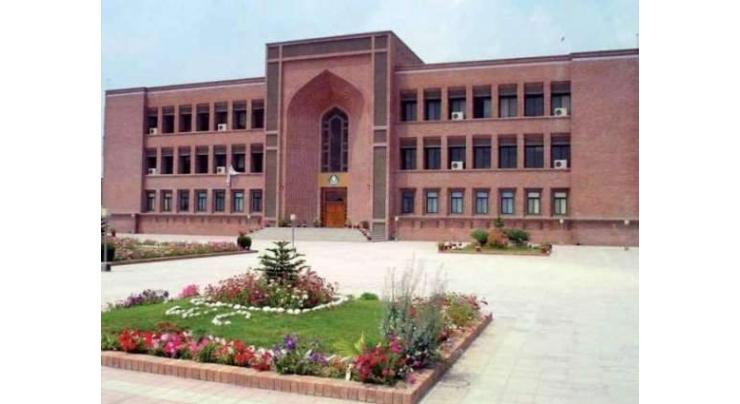
VCC Works Out Multi-pronged Strategy To Boost Revenue Generation Of Varsities
Umer Jamshaid Published April 22, 2019 | 09:43 PM

The Vice Chancellors Committee (VCC) on Monday worked out a multi-pronged fund-raising strategy in order to further improve revenue generation of public sector varsities and address future fiscal challenges
The initiative has been taken in a view of increased recurring expenses in higher education sector of the country.
Addressing a press briefing after Vice Chancellors Committee meeting, former VCC chairman and Rector International Islamic University Islamabad Dr. Masoom Yasinzai said that the Committee had chalked out a comprehensive plan to enable the universities for meeting their expenses on their own, in addition to the government's current financial support for the sector.
He said the higher education institutions would be encouraged for engaging alumni to generate funds, seek philanthropists' support, urge bilateral donations under the policy.
The initiative will also include non-tuition fee means like executive trainings and to encourage and formalize consultancies, attract fee-paying foreign students, strengthen public-private partnership, streamline patents and royalties, and promote sports activities, he added.
Masoom Yasinzai said the improved global competitiveness of Pakistani universities would help them cement their linkages with industries, providing an opportunity to generate funds and reduce demand-supply gap between academia and industry.
Newly elected VCC Chairman and Vice Chancellor Qauid-e-Azam International University Dr Muhammad Ali thanked the Committee members for reposing their confidence in him and electing him as a new chairman.
Dr Ali said he hoped that the government would increase the budgetary allocations for this sector in next financial year since it was keen to promoting the higher education in the country.
He said that the Committee members were assured by President of Pakistan Dr Arif Hussain Alvi in a recently held meeting that the government would not slash the higher education budget.
Dr Muhammad Ali said the Higher Education Commission (HEC) may increase the universities dues by 5 to 10 per cent but there was no plan to increase their tuition fee for the students.
To a query, he pointed out that affairs of universities were being managed without any political consideration.
According to the press statement issued by the HEC, the 23rd Vice Chancellors' Committee Meeting chaired by Dr. Masoom Yasinzai were attended by 137 Vice Chancellors (VCs) and Rectors of various public and private universities.
The VCs believed that the government would protect the higher education sector's budget despite an overall 10 per cent cut, for other government entities.
Appreciating the government's firm commitment for promoting higher education and research work in the country, the VCs hoped that its resolve would be evident in the upcoming release of funds.
The meeting discussed that HEC undertook an extensive budgetary assessment exercise, jointly with the Ministry of Finance, according to which the estimated requirement of the higher education sector for Fiscal Year 2019-20 was Rs.103.550 billion. However, as per Indicative Budgetary Ceilings (IBCs), a recurring grant of only Rs. 58.50 billion had been allocated for the higher education sector for Fiscal Year 2019-20.
The meeting also resolved to mobilise various non-government and non-tuition fee fundraising means and ensure initiatives aimed at efficient use of resources.
The meeting discussed in detail various agenda items including higher education sector's funding and emerging challenges, four-year integrated undergraduate programme, relevance in digital age, and HEC policies and regulations.
Addressing the Vice Chancellors, HEC Chairman Dr. Tariq Banuri said the sector had a strong and unambiguous support from the current government.
Referring to efficient use of resources, he said the operational expenditures needed to be controlled while rationalising faculty to student and faculty to staff ratios, controlling non-salary expenses, and targeting of funds towards most important areas.
Shedding light on HEC's regulatory reform project,Legal consultant HEC Dr. Daud Munir said the initiative was aimed at making HEC's regulations and guidelines in a way that could create a highly enabling regulatory environment for new and existing higher education institutions.
"Well-formulated regulatory frameworks can actually create greater autonomy, rather than constraining environment," he added.
Meanwhile, the meeting also elected Dr. Muhammad Ali as newChairman of the Vice Chancellors' Committee.
Related Topics
Recent Stories

SC orders end of encroachments in Karachi

Nazish Jahangir denies viral screenshots, calls them fake

Govt likely to hike electricity price once again

Bismah Maroof announces immediate retirement from international cricket

Malala expresses unwavering support for Gaza people

Selection committee dissolved over Pakistan women cricket team's poor performanc ..

Punjab CM Maryam Nawaz in police uniform at Chung police center

Currency Rate In Pakistan - Dollar, Euro, Pound, Riyal Rates On 25 April 2024

Today Gold Rate in Pakistan 25 April 2024

Mired in crisis, Boeing reports another loss

Session Awarding Ceremony 2024 held at Cadet College Muzaffarabad

Austrian ski great Hirscher to make comeback under Dutch flag
More Stories From Education
-

AIOU to host 37th annual conference of AAOU in Oct
18 hours ago -

SSC, HSSC annual exams in Sindh to be conducted in May
18 hours ago -

BISE Larkana SSC exams start on May 02
19 hours ago -

UUVAS arranges seminar to commemorate Allama Iqbal
22 hours ago -

BISE Hyderabad to announce HSC-Il result exams on April 25
22 hours ago -

Eco-friendly agri technology imperative to overcome environmental pollution: Hina Hafeezullah
3 days ago
-

Sindh to upgrade primary schools to reduce dropout rate
6 days ago -

SU extends deadline for submission of LLB (Hons) exam forms with late fee
6 days ago -

COMSTECH to hold 10th STEP on Facing Elderly
7 days ago -

Primary exams underway in Larkana
8 days ago -

SPSC starts viva of competitive exams 2020
8 days ago -

ABISE annual exams for secondary school certificate to begin from Thursday
8 days ago











